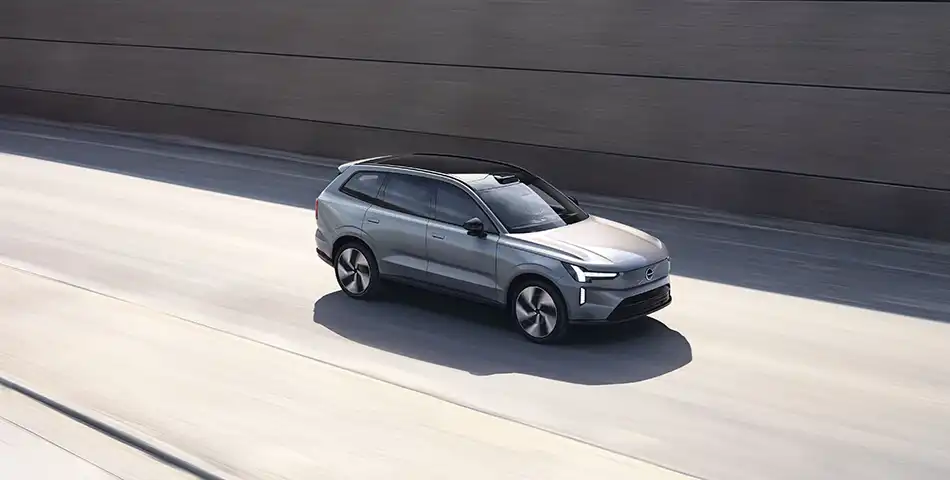
| Volvo | |
| Founded: | April 14, 1927 |
| Founders: | Assar Gabrielsson, and Gustaf Larsson |
| Employees | 100,000+ |
| Headquarters: | Gothenburg, Sweden |
| Manufacturing (Electric Vehicles): | Belgium, South Carolina, and China |
| IPO: | October 29, 2021 |
| EV Models: | XC40 Recharge, C40 Recharge, (EX40), EX30, EX90 |
| Federal Tax Credit Eligibility: | No |
Volvo Mission Statement
The mission statement for Volvo and Volvo electric vehicles is “make life easier, better and safer for everyone“.
A Tradition of Safety and Innovation
Embarking on a journey with Volvo Car Group is to traverse a path where tradition meets forward-thinking innovation, a route where the storied past of a venerable automaker aligns seamlessly with a future charged by electric ambition. Renowned for its unwavering commitment to safety, quality, and environmental stewardship, Volvo is charting a bold course toward an electrified horizon, redefining automotive luxury and sustainability through its lineup of electric vehicles (EVs) and hybrids, all while maintaining a synergistic relationship with Geely and Polestar.
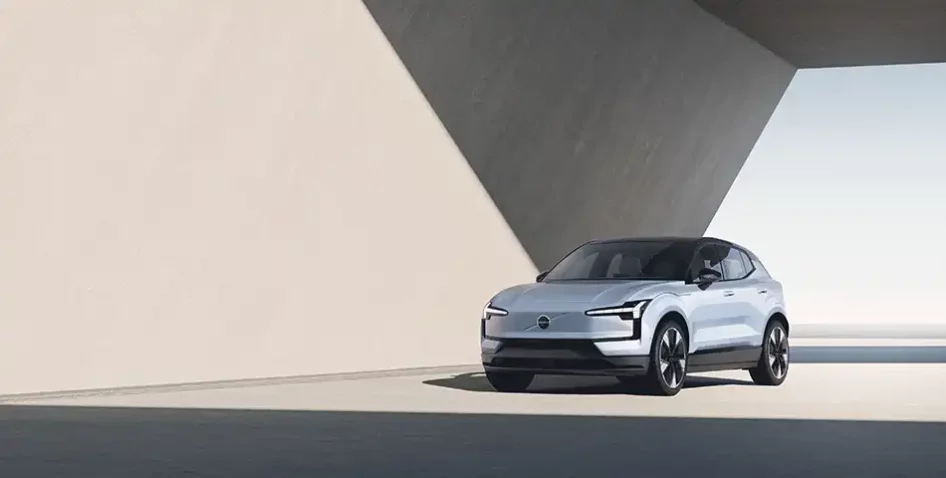
Volvo’s Legacy and Strategic Evolution
Since its inception in Gothenburg, Sweden, in 1927, Volvo has stood as a beacon of automotive reliability, where enduring safety and Scandinavian craftsmanship converge. This rich heritage underpins Volvo’s evolution, particularly its strategic pivot to electrification, reflecting a global momentum toward sustainable mobility. This shift is emblematic of Volvo’s innovation ethos, resonating with the industry-wide imperative to minimize environmental footprints and embrace a cleaner, greener future.
A Strong Future Investing in New Technologies and R&D
Volvo’s acquisition by Geely in 2010 marked a new chapter, providing the Swedish automaker with robust financial backing and a strategic foothold in the crucial Chinese market. This partnership has fueled Volvo’s R&D capabilities, particularly in electrification, allowing it to rapidly expand its electric and hybrid offerings.
Polestar, initially Volvo’s performance brand, has evolved into a standalone entity focused on electric performance vehicles. In 2024, Volvo dissolved their financial partnership. However, they continue to share R&D in their relationship, leveraging shared technology and design philosophies. This pushes the boundaries of what’s possible in electric performance and sustainability, thereby enriching Volvo’s EV lineup.
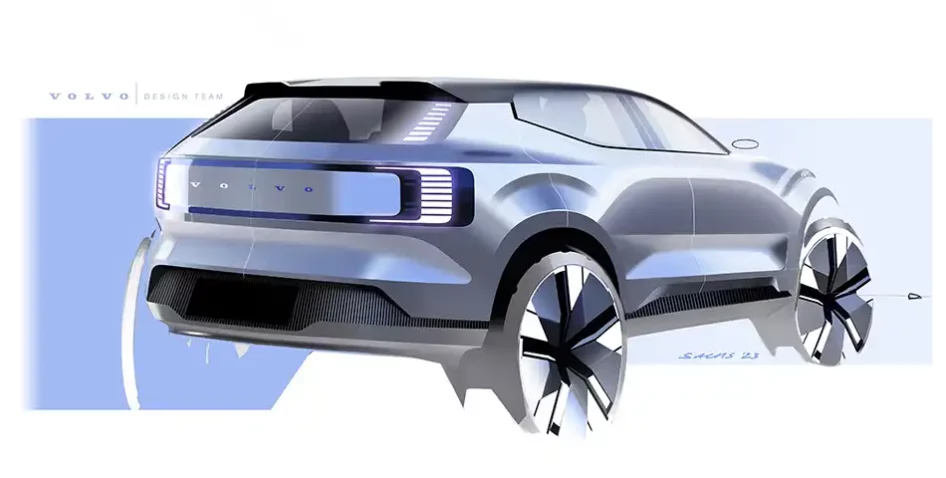
Integration of Hybrid Technologies
Volvo’s commitment to a greener future is evident in its comprehensive range of hybrid vehicles, serving as a bridge to full electrification:
- Hybrids: The S90 and S60 sedans, along with the V90 Cross Country and V60 Cross Country wagons, are equipped with hybrid technology. This represents Volvo’s commitment to enhancing fuel efficiency and reducing emissions, thereby providing a sustainable yet dynamic driving experience.
- Plug-in Hybrids: Volvo’s S90 Recharge and S60 Recharge sedans, alongside the V60 Recharge wagon, epitomize the brand’s fusion of performance and environmental consciousness. Moreover, these vehicles offer a compelling blend of combustion engines and electric motors. As a result, they deliver a powerful, efficient, and versatile driving experience that aligns with contemporary eco-conscious sensibilities.
Current Electric Vehicle Lineup and Technological Innovations
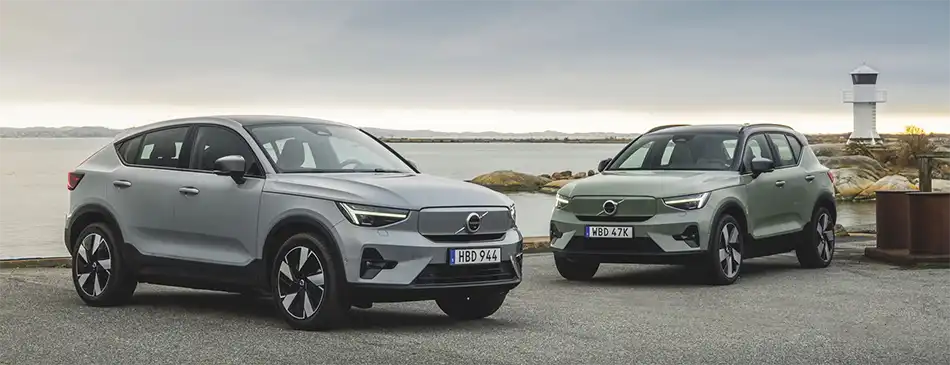
Volvo Electric Vehicles portfolio is a testament to its commitment to sustainability, infused with Scandinavian design principles that prioritize ergonomics, simplicity, and functionality:
- Volvo XC40 Recharge and C40 Recharge: These all-electric models are at the forefront of Volvo’s EV offerings, showcasing ergonomic design, advanced safety features, and a commitment to sustainablility.
- Volvo EX30: This model is designed to make electric driving accessible. It embodies Volvo’s core values in a compact, efficient package that appeals to a broad audience.
- Volvo EX90: Volvo’s flagship electric SUV, the EX90, combines luxury with cutting-edge technology, representing the pinnacle of its electric innovation.
Ergonomic Design and Advanced Technology
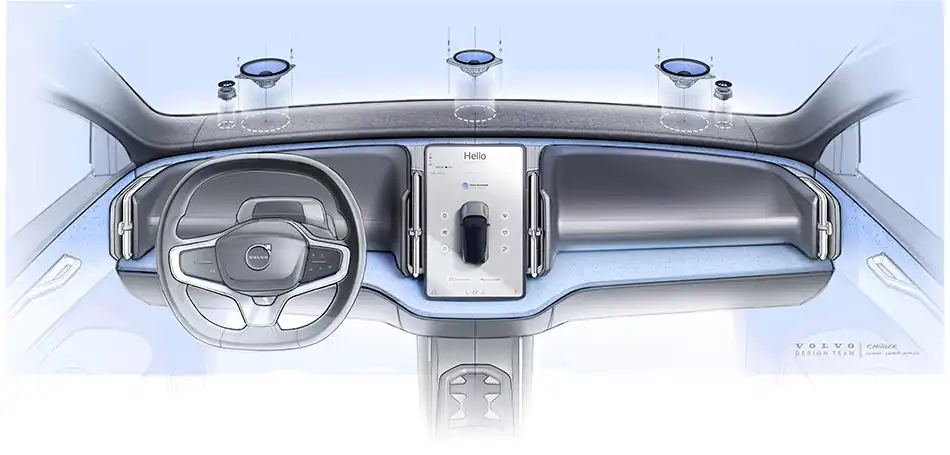
Volvo’s electric vehicles are designed with the user in mind, featuring intuitive interfaces, comfortable interiors, and advanced technology that enhances the driving experience while ensuring safety and sustainability. Moreover, the integration of high-tech features, such as advanced infotainment systems, autonomous driving capabilities, and over-the-air updates, makes Volvo a smart choice for the tech-savvy. This reflects Volvo’s commitment to a smart, connected future.
Volvo’s electric vehicles also have advanced safety features that help keep drivers and passengers safe. For example, the XC40 Recharge features a 360-degree camera that provides a bird’s-eye view of the car’s surroundings, making it easier to navigate tight spaces and avoid obstacles. Other safety features include automatic emergency braking, adaptive cruise control, and lane departure warning.
Volvo Electric Vehicles Manufacturing and Market Strategy
Volvo’s global manufacturing network, including significant investments in the United States, is pivotal in its strategy. The U.S. plays a crucial role, with Volvo’s South Carolina plant exemplifying the company’s commitment to local manufacturing and market-specific needs. This facility not only serves the American market but also acts as a critical export hub, underscoring Volvo’s global interconnectedness.
Standing out in the EV Marketplace
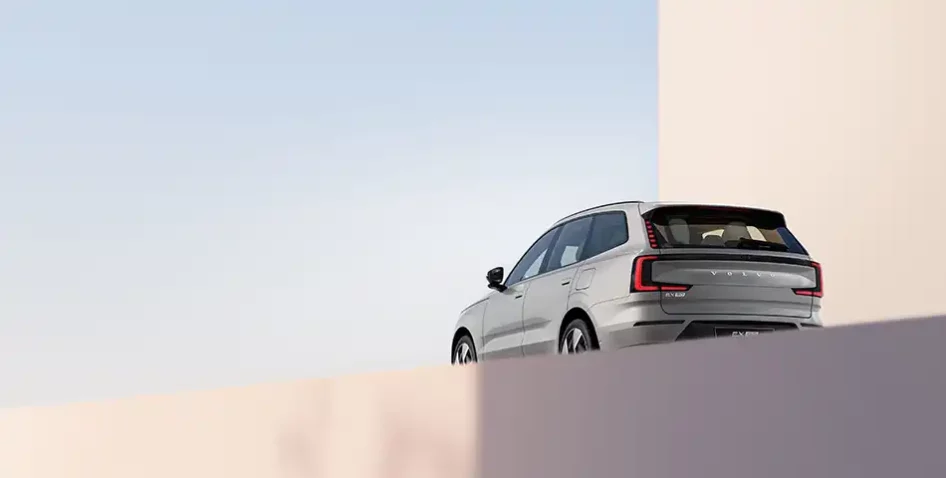
Volvo’s approach to the EV market is rooted in its core brand values of safety, sustainability, and Scandinavian design excellence. The company assures potential EV buyers that transitioning to electric doesn’t compromise safety. Volvo’s commitment to sustainability appeals to environmentally conscious consumers, with responsible sourcing of materials and climate-neutral manufacturing processes.
Volvo integrates cutting-edge technology seamlessly with elegant design, ensuring that each vehicle offers a premium, intuitive user experience. Advanced driver assistance systems, sophisticated infotainment, connectivity options, and over-the-air software updates make Volvo’s EVs smart and connected.
An Ethos of Cars Designed for Drivers
Volvo’s unique design ethos combines minimalist aesthetics with functional practicality, setting its vehicles apart in a crowded market. The interior and exterior design reflect a distinct Scandinavian heritage, resonating with consumers who value sophistication and understated elegance.
By emphasizing these aspects, Volvo distinguishes itself from competitors by offering a holistic package that aligns with the values and lifestyles of discerning electric vehicle shoppers.Future Planning and Volvo’s Vision
Looking ahead, Volvo’s roadmap includes expanding its EV lineup, enhancing its technological offerings, and advancing its sustainability goals. The company’s vision for the future is one where electric mobility is central, supported by innovative technologies and a commitment to an environmentally responsible ethos.
Volvo’s Electric Vehicles Support and Commitment to NACS Charging
Volvo has some exciting news! They are making moves to enhance the electric vehicle experience for their customers in the United States. By adopting the North American Charging Standard (NACS), Volvo is aligning itself with a growing network of charging infrastructure, which means that its electric vehicles will be compatible with a wide range of fast-charging stations. This is a significant step towards improving the accessibility of charging options for Volvo EV owners and demonstrates the company’s commitment to promoting sustainable mobility. By integrating NACS, Volvo drivers can look forward to a seamless charging experience, reinforcing the brand’s reputation for innovation and customer-centric solutions. It’s great to see companies like Volvo taking steps towards a cleaner and more sustainable future!
Challenges and Opportunities for Volvo Electric Vehicles in the EV Market
The transition to electrification presents challenges, including evolving market demands and the need for continuous innovation in technology. However, Volvo views these challenges as opportunities to lead, innovate, and redefine the automotive landscape, ensuring a sustainable, safe, and connected future.
Volvo has already made significant strides in addressing these challenges. For example, Volvo has committed to becoming a fully electric car company by 2030, five years earlier than previously planned. This ambitious goal will require Volvo to invest heavily in electric vehicle technology and infrastructure, but the company is confident it can meet the challenge.
Volvo is Creating a New Tradition of Safety and Innovation
Volvo electric vehicles present a compelling choice for electric vehicle shoppers, offering a range of EVs that combine environmental responsibility with luxury, safety, and advanced technology. The company’s strategic relationship with Geely and Polestar enhances its position in the EV market. At the same time, Volvo’s focus on ergonomic design and innovative technology ensures that its vehicles meet the needs of today’s drivers while paving the way for a sustainable, connected future.
Along with this, all Volvo electric vehicles come with advanced driver assist. In addition, all Volvo’s vehicles include a high-strength steel safety cage designed to minimize the impact of a collision and ensure maximum safety. This feature provides added protection to the occupants. With a commitment to safety, quality, and environmental stewardship, Volvo is well-positioned to lead the way in the electric vehicle revolution, demonstrating that tradition and innovation can coexist in a world where sustainability is paramount.
Electric Driver Conclusion Volvo Electric Vehicles
In summary, Electric Driver believes that the Volvo Car Group has made major strides towards a sustainable future with its lineup of EVs. By the end of 2024, the company will have expanded its EV offerings and is enhancing its technological capabilities, all while maintaining its commitment to safety, quality, and environmental stewardship. With a focus on ergonomic design, advanced technology, and responsible manufacturing practices, Volvo is well-positioned to stand out in the competitive EV market.
